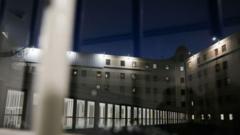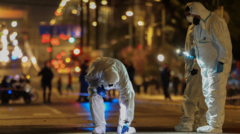The reported abduction of more than 80 government critics in Kenya has sparked significant public backlash, with fears that the country is reverting to its troubled past of state-sponsored kidnappings. Current investigations reveal alarming patterns reminiscent of the oppressive eras under former leaders.
Kenya Faces Public Outcry Over Surge in Alleged Abductions of Government Critics

Kenya Faces Public Outcry Over Surge in Alleged Abductions of Government Critics
Outrage grows as over 80 critics reportedly disappear amid fears of Kenya's dark historical patterns from the 1980s and 1990s return.
The recent abduction of over 80 government critics in Kenya has ignited substantial public outrage and concern regarding potential state-sponsored violence reminiscent of the country's past. Reports by the National Commission on Human Rights illustrate a worrying trend, especially following protest movements against proposed tax increases that erupted last June. As the situation escalates, a judge has threatened imprisonment for top security officials if they continue to evade court appearances regarding this concerning issue.
In the past six months, at least 24 individuals remain unaccounted for, while critics allege that police and governmental forces are using illegal abductions to silence dissent. The Inspector General of Police, Douglas Kanja, along with the Directorate of Criminal Investigations Director, Mohamed Amin, have been summoned to explain the circumstances surrounding the disappearances of seven social media influencers last December.
Among them, 24-year-old Billy Mwangi was abducted from a barbershop in his hometown and later returned, reportedly traumatized but safe. His father, Gerald Mwangi Karicha, noted the fear and shock lingering with his son, who was well-known for vocalizing criticism of the government on social media. Witnesses to his abduction described an alarming scene in which masked men forcibly kidnapped him from a public place.
Similar accounts follow the Longton brothers, Jamil and Aslam, who endured a 32-day ordeal characterized by violence and intimidation. Their experience highlights the brutal tactics reportedly employed by the supposed perpetrators. The brothers, who engaged in protest activities, claim their treatment was unlawful and reflective of a concerning trend within Kenyan security operations.
However, government representatives insist that these incidents do not involve official state operatives, implying possible ties to organized crime or political motivations. Despite public concerns, no one has faced charges for these alleged abductions, and various advocacy groups urge intervention on an international level, calling on the attorney general to escalate these cases to the International Criminal Court (ICC).
Calls for accountability have echoed throughout the nation with many Kenyans drawing parallels to the oppressive regime of Daniel arap Moi in the late 20th century. Activists recall how intimidation tactics were employed to suppress dissent and public expression. Yet, amidst their historical fears, advocates assert that the current social media landscape provides a platform that amplifies voices of dissent, making it increasingly challenging for the government to maintain control over the narrative.
As families of those still missing grapple with despair and uncertainty, the situation continues to unfold, marking a troubling chapter in Kenya's ongoing fight for human rights and the rule of law. "Most of the abductees were freed," lamented Stacey Mutua, sister of Steve Mbisi, a missing individual. "We are hoping they'll release him, but he is still missing. We’re praying he’ll be found."



















